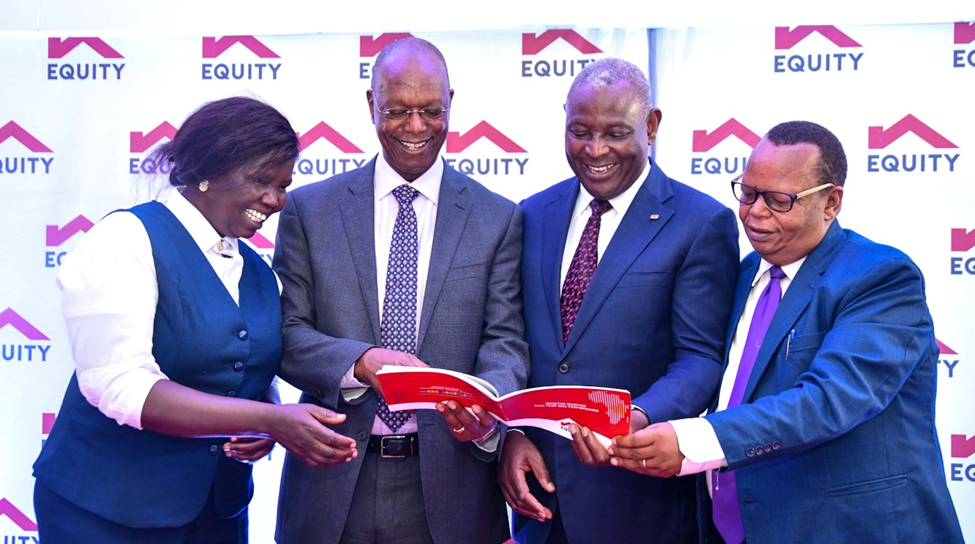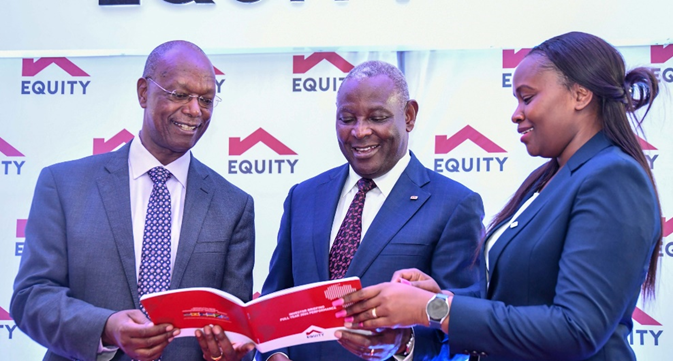Equity Group Holdings Plc has once again demonstrated strong financial performance in 2024, anchored on its strategy of diversification, innovation, and regional expansion.
The Group reported a Profit After Tax (PAT) of Kshs 48.8 billion, with Profit Before Tax (PBT) rising by 17% to Kshs 60.7 billion. Earnings Per Share (EPS) grew by 11% to Kshs 12.3, reflecting its solid financial management.
Dr. James Mwangi, the Group’s Managing Director and CEO, noted that the Group’s resilience amid global economic headwinds has been instrumental in sustaining growth.
“Our strong financial position allows us to support our customers and seize opportunities across the region,” he said during the FY2024 results announcement.
Equity’s total deposits reached Kshs 1.4 trillion, and its customer base expanded to 21.6 million. Liquidity remained solid, with cash and cash equivalents rising 19% to Kshs 345 billion. Investment securities hit Kshs 512 billion, boosting the liquidity ratio to 57%. These resources are enabling the Group’s flagship Africa Recovery and Resilience Plan (ARRP), aimed at empowering enterprises and communities through access to capital, skills, and digital tools.
Key strategic partnerships have been central to this mission. Collaborations with AfDB, Microsoft, and Mastercard are driving initiatives like Community Pass, which is digitizing 10 million farmers under the MADE Alliance. The Group also works with the World Food Programme to transform smallholder farmers into agribusiness entrepreneurs.
Equity Group’s regional operations have become increasingly vital, contributing 54% of PBT, 48% of loans, and 49% of assets. Subsidiaries in Rwanda, Tanzania, Uganda, and the DRC showed strong year-on-year (YoY) growth, with Uganda’s PAT soaring 186% and Tanzania’s by 107%. The Kenya subsidiary, while still significant, now contributes 46% of revenue. Kenya’s recent interest rate cuts have also positioned Equity Bank Kenya to grow its loan book and stimulate local economic activity.
In response to global uncertainties, Equity maintained a defensive risk approach with loan loss provisions of Kshs 20.2 billion. Its Non-Performing Loan (NPL) ratio stood at 12.2%, below the industry average of 16.4%, with an NPL coverage of 71%, highlighting strong asset quality.

Equity Life Assurance recorded a 58% growth in PBT to Kshs 1.5 billion, with a gross declared return of 13.5% for policyholders. The Group’s acquisition of a general insurance license enhances its ability to provide holistic insurance solutions across all customer segments. The Bancassurance unit saw a 6% increase in premium collections and a 50% surge in insurance premium financing, reflecting the Group’s expanding influence in insurance.
The Group’s digital strategy remains a cornerstone of its growth. Digital channels processed 86% of all transactions in 2024. Mobile banking transactions rose 67% to Kshs 3.174 trillion, while EazzyBiz grew 21% to Kshs 3.841 trillion. Merchant payments via Pay With Equity increased 14%, and ATM usage rose 21%. The ONE Equity platform continues to unify service delivery, improving customer experience and cross-selling opportunities.
Equity Bank was ranked the second strongest banking brand globally by Brand Finance and the most valuable in East and Central Africa, valued at USD 450 million. The Bank also secured top honors in categories such as SME Banking, Digital Banking, Agriculture Financing, and Wealth Management.
The Equity Leaders Program (ELP) continues to develop human capital, with 113 scholars joining top global universities in 2024. To date, the program has supported over 29,500 scholars and 9,700 internships, with 204 students attending Ivy League institutions.
In sustainability, the Group has planted over 35 million trees and disbursed USD 200 million in climate finance. Equity has distributed nearly 467,000 clean energy products and adopted global frameworks like TNFD and ANCA. It leads globally in climate-related transactions, according to IFC.
Social impact remains a core focus. Over 5.79 million people have received cash transfers, while 3.3 million patients have been served through Equity Afya Clinics. Additionally, 2.5 million women and youth have received financial education, and over Kshs 340.8 billion has been disbursed to MSMEs under the Young Africa Works program.
“As we look to the future,” concluded Dr. Mwangi, “we will continue to prioritize inclusion, sustainability, and innovation to create long-term value for our customers, shareholders, and communities across Africa.”











